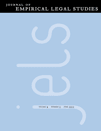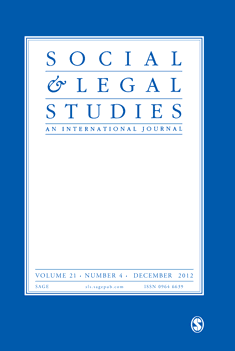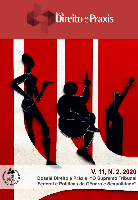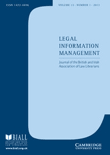
Journal of Empirical Legal Studies
Scope & Guideline
Elevating Legal Scholarship with Impactful Empirical Evidence
Introduction
Aims and Scopes
- Empirical Analysis of Legal Practices:
The journal publishes research that employs quantitative and qualitative empirical methods to examine various legal practices, enhancing the understanding of how laws function in real-world contexts. - Interdisciplinary Approaches:
The journal encourages interdisciplinary research that integrates insights from fields such as sociology, psychology, economics, and political science to enrich legal studies. - Impact Assessment of Legal Reforms:
Research focusing on the consequences of legal reforms and policies is a core area, providing evidence on their effectiveness and informing future legislative changes. - Diversity and Inclusion in Law:
The journal places emphasis on studies that explore issues of diversity, equity, and inclusion within legal frameworks, including the experiences of marginalized groups in legal systems. - Behavioral Insights in Legal Decision-Making:
A significant focus is on understanding how behavioral economics and psychology influence legal decision-making processes among judges, juries, and legal practitioners.
Trending and Emerging
- Impact of Technology on Law:
Research examining the implications of technology, such as data privacy, algorithmic bias, and the use of artificial intelligence in legal contexts, is increasingly prevalent, highlighting the need for legal frameworks to adapt to technological advancements. - Racial and Gender Bias in Legal Systems:
There is a growing focus on empirical studies that analyze the impacts of racial and gender biases in legal processes, including jury selection and sentencing, which is crucial for informing reforms aimed at achieving equity in the justice system. - Public Health and Legal Responses:
Recent publications have increasingly addressed the intersection of public health and law, particularly in the context of the COVID-19 pandemic, underscoring the importance of empirical research in shaping public health policies. - Behavioral Economics in Legal Decision-Making:
Emerging themes include the application of behavioral economics to understand decision-making in legal contexts, providing insights into how cognitive biases affect legal outcomes. - Legal Education Reform and Effectiveness:
There is a rising interest in assessing the effectiveness of legal education reforms, with studies focused on class participation, diversity, and the preparedness of law graduates for practice, reflecting ongoing changes in legal education.
Declining or Waning
- Historical Legal Analysis:
There has been a noticeable decrease in papers focusing on historical legal analysis, as the journal has shifted towards more contemporary empirical research that addresses current legal challenges. - Theoretical Legal Frameworks:
Research centered solely on theoretical legal frameworks without empirical backing appears to be waning, indicating a strong preference for studies that combine theory with empirical data. - Strict Legal Doctrinal Studies:
There is a decreasing trend in strictly doctrinal legal studies, which may suggest a growing recognition of the need for empirical evidence to support or critique legal doctrines. - Traditional Legal Education Analysis:
While legal education remains important, papers focusing on traditional critiques of legal education without empirical evaluation are becoming less frequent, as the journal favors evidence-based assessments. - Narrow Jurisdictional Studies:
The journal has moved away from studies that focus on narrow jurisdictional issues without broader implications, favoring research that offers wider applicability or insights across different legal systems.
Similar Journals

Journal of International and Comparative Law
Connecting Scholars to Contemporary Legal ParadigmsThe Journal of International and Comparative Law is a premier academic publication dedicated to advancing knowledge and sparking critical discourse in the field of law. Published by SWEET & MAXWELL, this journal aims to bridge the gap between international legal standards and comparative practices, making it an essential resource for legal scholars, practitioners, and students alike. With an impact factor that positions it in the Q3 category of legal journals and a Scopus rank of #534 out of 1025 in the Social Sciences - Law category, it is recognized for its contribution to the legal community since its inception in 2018. The journal, based in Hong Kong, seeks to publish high-quality, peer-reviewed articles that reflect a diverse range of legal perspectives and methodologies. Although the journal is not open access, it remains committed to disseminating vital research and case studies that shape contemporary legal paradigms. Scholars and legal professionals can stay informed on authoritative insights by engaging with this important resource until 2024 and beyond.

European Journal of Law and Economics
Exploring the Intersection of Legal Frameworks and Economic TheoryEuropean Journal of Law and Economics is a premier academic publication dedicated to the interdisciplinary examination of legal and economic issues, fostering dialogue at the intersection of these vital fields. Published by Springer, this journal, with its ISSN 0929-1261 and E-ISSN 1572-9990, has established itself in the academic community since its inception in 1994 and continues to thrive through its convergence until 2024. Located in the Netherlands, the journal has gained recognition for its rigorous research, reflected in its impressive Scopus rankings, notably ranked Q1 in Law and maintaining a Q2 status in Business and International Management as of 2023. With no Open Access policy, it serves as a vital source for researchers, professionals, and students who seek to deepen their understanding of the economic implications of legal frameworks and vice versa. The journal's focus on empirical studies and theoretical insights makes it an indispensable tool for those looking to innovate within the realms of law and economics.

SOCIAL & LEGAL STUDIES
Fostering Critical Conversations in Social and Legal StudiesSOCIAL & LEGAL STUDIES, published by SAGE Publications Ltd, stands at the forefront of interdisciplinary research within the spheres of law, sociology, and political science. With an ISSN of 0964-6639 and an E-ISSN of 1461-7390, the journal has established a significant presence in academia since its inception in 1992. This esteemed journal, recognized as a Q1 publication in Law and holding Q2 status in both miscellaneous Social Sciences and Sociology & Political Science categories, garners attention from leading scholars and practitioners alike, evidenced by its impressive Scopus rankings, including a top 88th percentile in Law. Although it does not offer open access, researchers and students can rely on this journal for high-quality, peer-reviewed articles that synthesize theoretical and empirical insights, addressing contemporary legal and social issues. As it converges into 2024, SOCIAL & LEGAL STUDIES continues to be a vital platform for advancing discussions that shape the interplay between societal norms and legal frameworks.

Direito e Praxis
Promoting innovative scholarship in legal dynamics.Direito e Praxis is a pioneering open-access journal dedicated to the interdisciplinary study of law, published by the esteemed Universidade do Estado do Rio de Janeiro, Faculdade de Direito. Since its inception in 2010, the journal has fostered scholarly communication in legal studies, providing a platform for researchers, practitioners, and students to engage with contemporary legal theories and practices. With a distinctive focus on the interplay between law and social dynamics, Direito e Praxis invites submissions that illuminate critical legal issues through diverse methodological approaches. In an era of increasing globalization and complexity in legal matters, this journal plays a vital role in disseminating knowledge and promoting dialogue among academics and legal professionals, particularly in the Latin American context. Researchers and students are encouraged to explore the wealth of articles that highlight innovative perspectives and contribute to the ongoing development of legal scholarship.

Access to Justice in Eastern Europe
Bridging Gaps, Building Justice Systems.Access to Justice in Eastern Europe is a pivotal journal published by the EAST EUROPEAN LAW RESEARCH CENTER that aims to enhance the understanding and discourse on legal access and justice systems within Eastern Europe. Since its inception in 2018, this open-access journal has made its valuable contributions freely available, fostering an inclusive academic environment for researchers, professionals, and students alike. With an impressive Q2 ranking in the field of Law and a notable Scopus Rank of #477 out of 1025 in the Social Sciences, this journal plays a crucial role in influencing policy and practice through evidence-based research. Addressing the nuances of legal access, the journal covers diverse topics including legal frameworks, social justice, and the impact of law on marginalized communities, with contributions from both local and international scholars. With an ongoing annual volume that extends to 2024, it serves as a vital resource for those committed to the advancement of justice in the region.

LAW & SOCIETY REVIEW
Bridging Disciplines for a Deeper Understanding of JusticeLAW & SOCIETY REVIEW is a prestigious academic journal published by Wiley, recognized for its significant contributions to the intertwined fields of law, sociology, and political science. With an impressive impact factor that underscores its relevance, the journal boasts a 2023 Q1 designation in both Law and Sociology, highlighting its elite status within these disciplines. Since its inception in 1977, the journal has served as a critical platform for innovative research and discourse, reflecting contemporary issues that influence legal and societal frameworks. Although it does not currently offer open access options, its robust archival resources and global reach ensure that researchers, practitioners, and students can benefit from the insights and empirical studies presented within its pages. With Scopus rankings placing it in the top percentiles of its field, LAW & SOCIETY REVIEW remains essential for those seeking to deepen their understanding of law in its social context and explore the complexities of legal systems and their societal impacts.

Ius Humani-Revista de Derecho
Fostering Innovation in Human Rights LawIus Humani-Revista de Derecho, published by Universidad Hemisferios, serves as a vital platform for discourse in the field of human rights law and its various dimensions. With an Open Access policy established since 2008, this journal ensures that scholarly articles, critical reviews, and original research are readily accessible to a global audience, fostering collaboration and innovation among researchers, professionals, and students alike. Although the journal is based in Quito, Ecuador, its reach extends internationally, making significant contributions to the understanding and application of human rights in legal frameworks. While it is still developing in terms of its HIndex and Scopus rankings, Ius Humani is poised to provide essential insights and discussions that reflect pressing legal issues and emerging trends in human rights law. Join the community of scholars engaging with this important field through Ius Humani, where knowledge is freely shared and impactful conversations are sparked.

UNIVERSITY OF PITTSBURGH LAW REVIEW
Advancing Legal Thought, One Article at a Time.University of Pittsburgh Law Review is a prestigious academic journal that stands as a cornerstone in the field of legal scholarship. Published by the University of Pittsburgh, University Library System, this journal has been contributing to the discourse of the law since its inception, exemplifying a commitment to advancing scholarly work in various legal domains. Although its open access options are limited, the robust collection of articles and commentaries—spanning from 1973 to the present—provides an invaluable resource for researchers, professionals, and students alike. The journal currently ranks in the Q4 quartile within the field of law for 2023, indicating a specialized focus and offering significant opportunities for legal analysis and research. Positioned in a competitive landscape as Rank #784 out of 1025 in Scopus for Social Sciences - Law, it is an essential platform for emerging voices and innovative ideas that shape legal thought and policy. The University of Pittsburgh Law Review continues to foster critical examination and discussion, making it a vital resource for anyone engaged in the study or practice of law.

IOWA LAW REVIEW
Advancing legal scholarship for a just society.IOWA LAW REVIEW is a prestigious legal journal published by the University of Iowa College of Law, dedicated to advancing the discourse in the field of law. Since its inception, this journal has become a vital resource for legal scholars, practitioners, and students, committed to publishing rigorous and thought-provoking articles that address contemporary legal challenges. With a strong emphasis on contributions from a diverse range of legal fields, including constitutional law, criminal justice, and property law, the IOWA LAW REVIEW maintains a Q1 ranking in law, reflecting its significance and influence on legal scholarship globally. While the journal is not currently open access, it provides critical insights and perspectives that are essential for understanding the evolving landscape of law. Additionally, with its ranking of #314 out of 1025 in the Scopus database, the journal demonstrates a high impact within the legal community. Scholars and practitioners alike are encouraged to engage with its scholarly articles, as they not only highlight key legal issues but also propose innovative solutions to complex societal problems.

Legal Information Management
Shaping the Future of Legal Research and Practice.Legal Information Management is a prestigious journal published by Cambridge University Press that serves as an essential resource for professionals, researchers, and students engaged in the dynamic field of legal studies. With a focus on the intersection of law and information management, this journal provides a platform for exploring contemporary issues, best practices, and innovative solutions related to the management of legal information and resources. Although it does not currently offer Open Access options, its rigorous peer-review process ensures the publication of high-quality research that significantly impacts legal education and practice. With its strong academic reputation and commitment to advancing knowledge in legal information management, this journal is crucial for anyone looking to stay updated on critical developments in the field. Located in Cambridge, England, this journal continues to strive towards enhancing the accessibility and understanding of legal information structures globally.